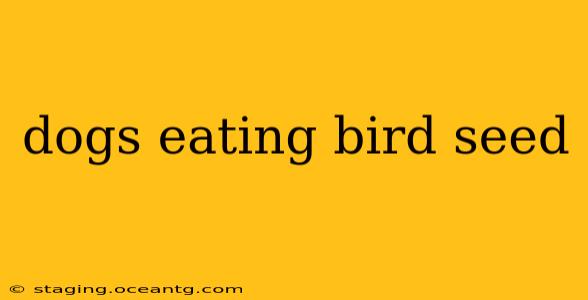Many dog owners have likely witnessed their furry friends exhibiting an unexpected interest in birdseed. Whether it's a sneaky nibble from a spilled bag or a determined raid on the bird feeder, the question remains: is birdseed safe for dogs? The short answer is: it depends. While some types of birdseed pose minimal risk, others can be quite harmful to our canine companions. This comprehensive guide will delve into the potential dangers, benefits (yes, there are some!), and how to keep your dog safe around birdseed.
Is birdseed toxic to dogs?
The toxicity of birdseed depends heavily on the ingredients. Many mixes contain seeds and grains that are relatively harmless in small quantities, such as sunflower seeds (in the shell are preferable), millet, and cracked corn. However, other components can be problematic. Certain seeds, like flax and niger seeds, can cause digestive upset if consumed in large amounts. The biggest concern often lies in the added ingredients. Some commercial birdseed mixes contain additives, preservatives, and even potentially toxic substances, although these are less common. Therefore, a simple "yes" or "no" answer to the toxicity question is insufficient.
What happens if a dog eats birdseed?
The effects of ingesting birdseed will vary depending on the type of seed, the amount consumed, and the individual dog's sensitivity. Minor ingestion of relatively safe seeds might result in no noticeable symptoms. However, larger quantities or consumption of more problematic seeds could lead to:
- Gastrointestinal upset: This is the most common reaction, manifesting as vomiting, diarrhea, and abdominal pain.
- Obstruction: Larger seeds or hulls can cause blockages in the digestive tract, requiring veterinary intervention.
- Allergic reactions: Some dogs might have allergic reactions to specific types of birdseed, resulting in skin irritation or respiratory problems.
- Toxicity: In rare cases, birdseed containing toxic additives or moldy seeds can cause more serious health problems.
What kind of birdseed is safe for dogs?
Generally, small amounts of plain sunflower seeds (in the shell are best as they are harder to eat in large quantities) and millet are considered relatively safe. However, it's crucial to remember that moderation is key. Even seemingly harmless seeds can cause digestive issues if consumed in excess. Avoid giving your dog birdseed directly, as it is not a suitable part of their diet.
My dog ate a lot of birdseed – what should I do?
If your dog has consumed a significant amount of birdseed, especially if you notice any concerning symptoms like vomiting, diarrhea, or lethargy, contact your veterinarian immediately. Prompt veterinary care is crucial, especially if an intestinal obstruction is suspected. Try to gather information about the type of birdseed ingested and the approximate quantity consumed to provide your vet with useful context.
Can I give my dog birdseed as a treat?
No. Birdseed is not a suitable treat for dogs. Their nutritional needs are quite different from birds, and birdseed lacks the essential nutrients a dog requires for optimal health. Stick to dog-specific treats that are formulated to meet their dietary requirements.
How can I prevent my dog from eating birdseed?
Preventing your dog from accessing birdseed involves several strategies:
- Secure storage: Keep birdseed in sealed containers out of your dog's reach.
- Elevated feeders: Use bird feeders that are hung high and difficult for your dog to reach.
- Supervise feeding: If you have a bird feeder, supervise your dog when they are outside to prevent them from accessing it.
- Training: Teach your dog a reliable "leave it" command to deter them from approaching the birdseed.
By understanding the potential risks and taking preventative measures, you can ensure your canine companion remains safe and healthy, even with the tempting presence of birdseed. Remember, when in doubt, consult your veterinarian.
